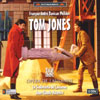Philidor Tom Jones
Tom Jones transported to France makes an engaging experience
View record and artist detailsRecord and Artist Details
Composer or Director: François-André Danican Philidor
Genre:
Opera
Label: Dynamic
Magazine Review Date: 11/2006
Media Format: CD or Download
Media Runtime: 137
Mastering:
Stereo
DDD
Catalogue Number: CDS509/1-2

Tracks:
| Composition | Artist Credit |
|---|---|
| Tom Jones |
François-André Danican Philidor, Composer
Ana Tordera, Aubergiste Carine Séchehaye, Honora, Soprano Dominique Bonnetain, Powerfist François-André Danican Philidor, Composer Frédéric Burdet, Buttercup Guillaume Michel, Jellyfisch Jean-Claude Malgoire, Conductor Jean-Pascal Cottier, Gumtree Lausanne Sinfonietta Léonardo Pezzino, Allworthy, Baritone Marc Barrard, M. Western, Bass-baritone Pierre Arbel, Dowling, Speaker Rodolphe Briand, Blifil, Tenor Sébastien Droy, Tom Jones, Tenor Sibyl Zanganelli, Mme. Western, Mezzo soprano Sophie Marin-Degor, Sophie, Soprano |
Author: David Vickers
Henry Fielding’s novel Tom Jones was published in 1749, at around the time Francois-André Philidor was living in London, making a living from his prowess at chess. Although Philidor was a talented musician who sang as a boy treble in the royal chapel at Versailles, where he was taught by Campra, he does not seem to have pursued a musical career with notable dedication until his return to Paris in 1754, during an intensive period of quarrelling between the lovers of progressive Italian music and the upholders of the French tradition.
Between 1756 and 1788 Philidor composed many works for Parisian theatres, and is generally credited with elevating opéra comique into a nobler art form. Tom Jones was premiered by the Comédie-Italienne (at the Théâtre de l’Hôtel de Bourgogne) on February 27, 1765, featuring a libretto which uses early scenes from Fielding’s novel and simplifies the rest. Initially the opera was poorly received but Philidor’s extensive revision for a revival the following year was a popular success.
Jean-Claude Malgoire shows no sign of slowing his lifelong pioneering exploration of Baroque and early-Classical operatic repertoire. The Lausanne Sinfonietta play with graceful wit. This live performance has a few rough edges, yet it is an enjoyable document of an evidently amusing, lively and communicative staged production. The long stretches of dialogue are acted with clarity, affection and thoughtful comic timing. Philidor invested the title-role with some impressive lyrical high tenor writing, although Sébastien Droy’s singing is a little dry. Marc Barrard’s performance of Mr Western’s “D’un cerf dix cors” (in which he brags about his prowess in hunting) is stirring enough to make an impact, although I would very much relish hearing it with Philidor’s marvellous horn and woodwind reinforcements played with a stronger impression of rhythmic tautness and brighter orchestral colour. One wonders whether Mozart knew Sophie’s show-stealing soliloquy in Act 3 (“Où suis-je?…Ô toi qui ne peux m’entendre”), which features an extensive orchestral recitative and magnificent aria. Those curious about French opera repertoire between Rameau and Gluck need look no further than Tom Jones for an invigorating example.
Between 1756 and 1788 Philidor composed many works for Parisian theatres, and is generally credited with elevating opéra comique into a nobler art form. Tom Jones was premiered by the Comédie-Italienne (at the Théâtre de l’Hôtel de Bourgogne) on February 27, 1765, featuring a libretto which uses early scenes from Fielding’s novel and simplifies the rest. Initially the opera was poorly received but Philidor’s extensive revision for a revival the following year was a popular success.
Jean-Claude Malgoire shows no sign of slowing his lifelong pioneering exploration of Baroque and early-Classical operatic repertoire. The Lausanne Sinfonietta play with graceful wit. This live performance has a few rough edges, yet it is an enjoyable document of an evidently amusing, lively and communicative staged production. The long stretches of dialogue are acted with clarity, affection and thoughtful comic timing. Philidor invested the title-role with some impressive lyrical high tenor writing, although Sébastien Droy’s singing is a little dry. Marc Barrard’s performance of Mr Western’s “D’un cerf dix cors” (in which he brags about his prowess in hunting) is stirring enough to make an impact, although I would very much relish hearing it with Philidor’s marvellous horn and woodwind reinforcements played with a stronger impression of rhythmic tautness and brighter orchestral colour. One wonders whether Mozart knew Sophie’s show-stealing soliloquy in Act 3 (“Où suis-je?…Ô toi qui ne peux m’entendre”), which features an extensive orchestral recitative and magnificent aria. Those curious about French opera repertoire between Rameau and Gluck need look no further than Tom Jones for an invigorating example.
Discover the world's largest classical music catalogue with Presto Music.

Gramophone Digital Club
- Digital Edition
- Digital Archive
- Reviews Database
- Full website access
From £8.75 / month
Subscribe
Gramophone Full Club
- Print Edition
- Digital Edition
- Digital Archive
- Reviews Database
- Full website access
From £11.00 / month
Subscribe
If you are a library, university or other organisation that would be interested in an institutional subscription to Gramophone please click here for further information.




